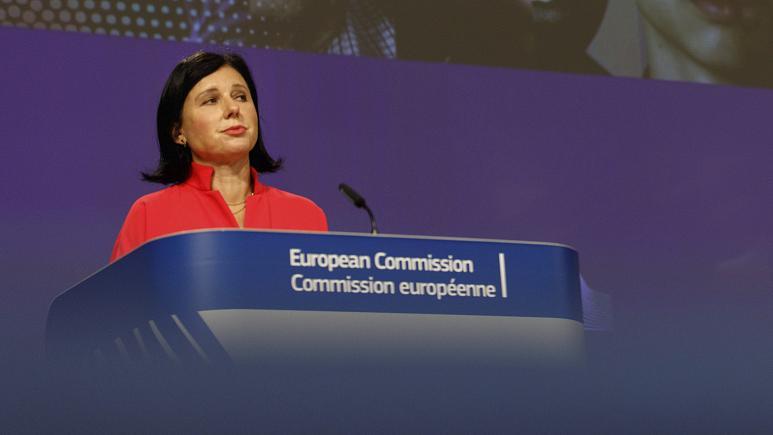Hungarian Prime Minister Viktor Orbán has called for the resignation of European Commission Vice President Věra Jourová over her derogatory statements about Hungarian democracy. Demanding the removal of the Commissioner nominated by Hungary’s close ally in the Visegrad Group, Czech Prime Minister Andrej Babiš, is a direct consequence of Jourová’s controversial statements, regarding Hungarian democracy, expressed in an interview published by the German Der Spiegel on Friday. PM of Hungary argues that Jourová, by making direct political attack on Hungary, violated the Treaties, and thus, cannot pose any longer as the guardian of EU law. Furthermore, PM Viktor Orbán made an unprecedented move in EU history when deciding to cut political ties with the Commissioner in charge of European values and the rule of law until her resignation is completed.

The Czech Commissioner said: “Mr Orbán likes to say that he is building an illiberal democracy. I would say: he’s building an ill democracy.” As the Politico points out, the German-language interview transcript used the word “krank”, which can be translated as either “sick” or “ill”. Furthermore, Jourová added that “wide majority of Hungarians are possibly no longer in a position to form a free opinion”.
PM Orbán, in his letter addressed to Commission President Ursula von der Leyen, argues that Jourová’s statements are “direct political attack against the democratically elected Government of Hungary” and a “humiliation to Hungary and the Hungarian people.” PM of Hungary is on the view that Jourová’s statements “are in contradiction with the Commission’s role as a neutral and objective institution”, are a “blatant violation of the principle of sincere cooperation”, and thus, are incompatible with the Commissioner’s current mandate. Therefore, Viktor Orbán concludes that Jourová must resign from her office, and until that the Government of Hungary suspends all bilateral political contacts with her.
Under the Treaty on the European Union (TEU), members of the Commission shall be persons whose independence is beyond doubt. Article 17 (3) TEU also stipulates that in carrying out its responsibilities, the Commission shall be completely independent. This means that the Commission and the Commissioners, on the one hand, must be independent from any Member State government or other political entity, especially may not receive any instructions from national governments, and, on the other hand, must not be biased towards any Member States or other political players but to represent and uphold the interests of the EU as a whole.
Calling a Member State’s democracy “sick” is, however, well beyond the line a member of a politically independent body can afford, both from a legal and a political perspective. Such unfounded and unnecessarily harsh statement cannot be the basis of a constructive debate between the Commission and the Member States, especially in a highly sensitive political topic like European values and the rule of law. The situation of rule of law in Member States can and should be debated, but not in such a destructive, non-professional and non-European way. Therefore, Commissioner Jourová’s words cannot be considered as politically independent, and thus, must be seen as the violation of the duties of the Commission under the Treaties. Moreover, the fact that the Commissioner responsible for the rule of law makes such unconventional political statement right before publishing the rule of law reports of the Commission on the Member States is not only unethical from a political point of view, but raises the question whether how unbiased the Commission can be when examining the situation of rule of law in the Member States, especially in Hungary.
Although Commission President Ursula von der Leyen backed her fellow Commissioner, this case raises a very important question of the European integration theory: can the Commission still be seen as a politically independent, bureaucratic body of the EU, as it is written in the Treaties, or Ursula von der Leyen carries on Juncker’s legacy on a “political Commission”?
PM Orbán’s response breaking the political ties with Commissioner Jourová is undoubtedly unprecedented. No Member State have ever made such response in course of a political clash with a Commission. Therefore, it is not clear yet how will this look like on an everyday basis, especially in terms of harmonizing national law with EU law. It may also result in rise of infringement cases launched against Hungary, however, such a scenario cannot be a common European interest, and as such cannot be supported by the Commission as it would undermine the whole European project.
This unusually sharp political clash between Hungary and Commissioner Jourová is also interesting from a Visegrad Group perspective. Věra Jourová is the member of political party ANO, established and leaded by Andrej Babiš, current Prime Minister of the Czech Republic. PM Orbán and Babiš, however, closely cooperate within the V4 Group, among others enhancing the joint action of Central Eastern Europe in relation to the rule of law as well. On the other hand, PM Babiš and his business interests are often targeted by European Parliament, raising concerns about the misuse of EU funds. Therefore, this is a good reason for PM Babiš to keep a close friend in the Commission and keep the rule of law portfolio under Czech supervision. Obviously, as earlier mentioned, the Commissioners most not receive any instruction from national governments, especially not from their “home government”. However, remaining silent in this case pays off for the Czech Prime Minister, while he may wish a good luck for his Visegrad fellows, Poland and Hungary, for the political debates with the European Commission over the rule of law.
30.09.2020. Balázs Tárnok
Photo: AP Photo